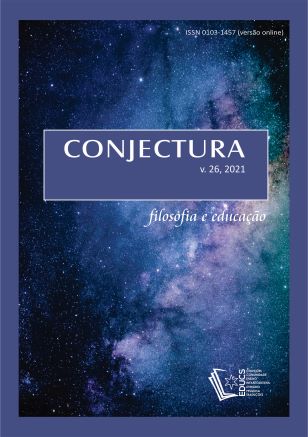The relevance of Otto Willmann’ pedagogical thought
DOI:
https://doi.org/10.18226/21784612.v26.e021032Abstract
: This theoretical essay has as main objective to analyze and debate the thought, mainly in the educational area, of the Austrian pedagogist and philosopher Otto Willmann, considered the founder of modern social pedagogy. This is a bibliographic study, which uses, in the foreground, the only work of the author translated into Portuguese and others written by contemporary commentators, as well as recent texts of reflection, in which the historical context is analyzed, the influences he suffered, such as Johann Friedrich Herbart’s theories, his biography, his works and not only his contribution to the history of pedagogical thought, but also possible contributions to the current educational situation. In a period of great changes of thought in the West, mainly in the Germanic world of the 19th century, one of the aspects discussed is how Otto Willmann managed to reconcile the individual aspect with the social aspect in Pedagogy, avoiding some of the characteristic extremisms of his time, such as psychologism and social determinism, being a pioneer of social pedagogy. In addition, it seeks to demonstrate how he constituted himself as a public intellectual, in the sense coined by Henry Giroux, contributing to changes in his reality, in this case, the Austrian Empire. It is understood, then, that Willmann constituted himself as a thinker who sought to reconcile the individual and social aspects in pedagogy and didactics, justifying, from that, the scientificity of both areas and demonstrating the importance of the study of sociology and the history of education (including the history of pedagogical ideas) as auxiliary sciences for education.
Keywords: Otto Willmann. Social pedagogy. History of pedagogical ideas. Philosophy of education.
References
ACKER, L. V. Frans de Hovre: o homem e a obra. In: HOVRE, F. DE. Ensaio de filosofia pedagógica. São Paulo: Editora Nacional, 1969, p. XIII - XX.
AMARAL, M. N. C. P. Dilthey: Hermenêutica da vida e universalidade pedagógica. Trans/Form/Ação (UNESP. Marília. Impresso), v. 35, p. 88-114, 2012. Disponível em: https://repositorio.usp.br/bitstream/handle/BDPI/38835/S0101-31732012000100007.pdf?sequence=1
ANTOLÍ, V. B. A didática como espaço e área do conhecimento: fundamentação teórica e pesquisa didática. In: FAZENDA, I. (Org.). Didática e interdisciplinaridade. Campinas: Papirus, 1998, p. 77-108.
BEISER, F. C. After Hegel: German Ghilosophy, 1840–1900. Princeton: Princeton University Press, 2014.
BEISER, F. C. Late German Idealism: Trendelenburg and Lotze. Oxford: Oxford University Press, 2013.
DEWEY, J. Democracy and education: an introduction to the philosophy of education. New York: Macmillan, 1916.
DURKHEIM, E. Educação e sociologia. Petrópolis: Editora Vozes, 2014.
FOERSTER, F. W. Willmann als Pädagog. Katholische Schulblätter, abr. 1914.
FORTES, R. V. Da “coisa da lógica” à “lógica da coisa”: a inflexão da ontologia no pensamento do jovem Marx. Sapere Aude: Revista de Filosofia, v. 9, p. 40-60, 2018. Disponível em: https://doi.org/10.5752/P.2177-6342.2018v9n18p40-60
FRANCO, M. A. S.; LIBÂNEO, J. C.; PIMENTA, S. G. Elementos para a formulação de diretrizes curriculares para cursos de pedagogia. Cad. Pesq., São Paulo, v. 37, n. 130, p. 63-97, Apr. 2007. Disponível em: https://www.scielo.br/scielo.php?pid=S0100-15742007000100005&script=sci_arttext&tlng=pt
FREITAS, L. G. O. Apresentação. In: TRENDELENBURG, F. A. A questão lógica no sistema de Hegel: dois panfletos. São Paulo: Edições Loyola, 2018, p. 5-13.
GHIRALDELLI JUNIOR, P. História da educação. São Paulo: Cortez, 2000.
GIL, A. C. Métodos e técnicas de pesquisa social. São Paulo: Atlas, 2008.
GIROUX, H. A. Os professores como intelectuais: rumo a uma pedagogia crítica da aprendizagem. Porto Alegre: Artes Médicas, 1997.
HILGENHEGER, N. Johann Herbart. Recife: Fundação Joaquim Nabuco, Editora Massagana, 2010.
HOVRE, F. Estudo sobre as Ideias de Otto Willmann. In: WILLMANN, O. A Ciência da Educação: I- Introdução à Ciência da Educação. Porto Alegre: Editora Globo, 1952. p. 3-120.
HOVRE, F. Ensaio de filosofia pedagógica. São Paulo: Editora Nacional, 1969.
LIBÂNEO, José Carlos. Pedagogia e pedagogos, para quê? São Paulo: Cortez, 2010.
LOURENÇO FILHO, M. B. Introdução ao estudo da nova escola: bases, sistemas e diretrizes da pedagogia contemporânea. 14 ed. Rio de Janeiro: EdUERJ: Conselho Federal de Psicologia, 2002.
LUZURIAGA, L. História da Educação e da Pedagogia. Companhia Editora Nacional: São Paulo, 1963.
MARITAIN, J. Prefácio da edição francesa. HOVRE, F. Ensaio de filosofia pedagógica. São Paulo: Editora Nacional, 1969.
MONFREDINI, I. Textos selecionados. In: HILGENHEGER, N. Johann Herbart. Recife: Fundação Joaquim Nabuco, Editora Massagana, 2010.
PATRÍCIO, M. F. Antelóquio. In: HERBART, J. F. Pedagogia Geral. Lisboa: Fundação Calouste Gulbenkian, Serviço de Educação e Bolsas, 2003.
PINKARD, T. German Philosophy 1760-1860: The Legacy of Idealism. Cambridge: Cambridge University Press, 2002.
PORTA, M. A. G. (Org.). Brentano e a sua escola. São Paulo: Loyola, 2014.
SAVIANI. D. História das ideias pedagógicas no Brasil. Campinas, SP: Autores Associados, 2019.
TRENDELENBURG, F. A. A questão lógica no sistema de Hegel: dois panfletos. São Paulo: Edições Loyola, 2018.
WILLMANN, O. A Ciência da Educação: I - Introdução à Ciência da Educação. Porto Alegre: Editora Globo, 1952.
Downloads
Published
How to Cite
Issue
Section
License
1. The publication of the originals will imply the assignment of copyright to Conjectura Journal.
2. Texts cannot be reproduced without authorization from the Journal after acceptance.









